-
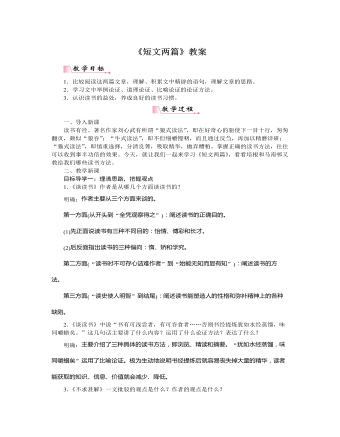
部编版语文九年级下册《短文两篇》教案
4.《不求甚解》一文分析了陶渊明怎样的读书态度,请指出“不求甚解”的两层含义。明确:态度:养成“好读书”的习惯;读书要诀在于“会意”。含义:第一,虚心,书不一定都能读懂;第二,读书方法:不固执一点,而要了解大意。5.《不求甚解》一文是驳论文还是立论文?又是如何驳或者立的?谈一谈你的理解。明确:驳论文。驳的是“论点”,先全面阐述“不求甚解”的含义,进而提倡虚心的“不求甚解”的读书态度,从而表明自己的观点;又从“会意”角度,列举古人读书的例子,并阐明自己的正确论点:读书在会意,不要死抠字眼,为一个局部而放弃整体;最后又强调了“书必须反复读”的主张。这样通过树立自己正确的观点从而驳倒敌论。
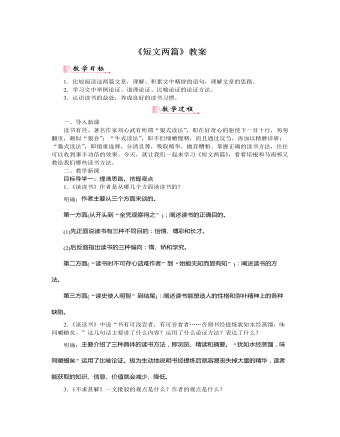
部编版语文九年级下册《短文两篇》教案
4.《不求甚解》一文分析了陶渊明怎样的读书态度,请指出“不求甚解”的两层含义。明确:态度:养成“好读书”的习惯;读书要诀在于“会意”。含义:第一,虚心,书不一定都能读懂;第二,读书方法:不固执一点,而要了解大意。5.《不求甚解》一文是驳论文还是立论文?又是如何驳或者立的?谈一谈你的理解。明确:驳论文。驳的是“论点”,先全面阐述“不求甚解”的含义,进而提倡虚心的“不求甚解”的读书态度,从而表明自己的观点;又从“会意”角度,列举古人读书的例子,并阐明自己的正确论点:读书在会意,不要死抠字眼,为一个局部而放弃整体;最后又强调了“书必须反复读”的主张。这样通过树立自己正确的观点从而驳倒敌论。

部编人教版四年级下册《文言文二则》创新教案
三、教学过程(一)导入新课:1.师:同学们,中国是世界上历史最悠久的国家之一,在漫漫的历史长河中,产生了大量的神话传说和历史故事,后来人们把这些神话传说和历史故事加以锤炼,便形成了许多脍炙人口的成语。下面,让我们一起来感受下中华语言文化的精华,背诵下我们积累的成语。)2.学生起头,背诵成语接龙。(在今后的学习中我们还会积累更多的成语,希望同学们继续保持这种学习精神。)3.导入:成语是我国语言文化的精华,它们有的庄重严肃,有的机智幽默,而且大多数的成语背后都有一个生动的故事。今天老师给大家带来个有趣的成语故事,大家想不想看?这个成语故事的名字叫做“铁杵成针”。(板书课题:铁杵成针)不过,老师有个要求,希望同学们能带着这些问题认真去观看。

部编人教版四年级下册《文言文二则》教案
一、谈话交流,导入课题。1.同学们,《凿壁偷光》的故事大家听说过吗?【课件出示2:图文】匡衡勤奋好学,可是家境贫寒,晚上想读书而无烛照明。邻居家倒是每到夜晚,总烛光明亮,可惜这光照不到他匡衡的屋里。怎么办呢?匡衡便把自己家靠邻舍的那堵墙壁凿开一个洞以引邻居家的烛光来读书。古时候,还有一位热爱读书的人,他是晋代车胤,因为家贫,没钱买灯油,而又想晚上读书,便在夏天晚上抓一把萤火虫来当灯读书。2.这个故事就是《囊萤夜读》,今天,我们来学习一下这个小故事。(板书:囊萤夜读)学生齐读课题。3.这是一篇文言文。千古传诵,流传至今。4.补充文言文知识:文言文人们通常说古文。我国是一个文明古国,我国古代有着灿烂的文化,有着浩如烟海的文学艺术瑰宝,他们都是以文言文的形式记载下来的。我们要去传承民族的瑰宝,就要学好文言文。【课件出示3】
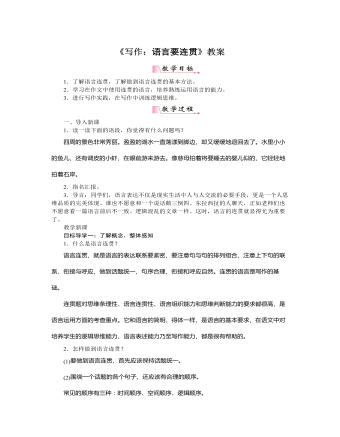
部编版语文八年级上册《写作:语言要连贯》教案
(3)也可以用散文的形式将某一个传统节日的历史渊源娓娓道来,从宏观层面追溯千年历史。2.佳作欣赏节 日在一阵阵爆竹声中,一阵阵欢歌笑语中,我们终于迎来了春节!春节,是中国最盛大的节日,也是我们最高兴的日子。家家张灯结彩,街面上修饰一新,一派喜气洋洋的景象。爸爸妈妈也早早地把家里布置一新,置办了年货,我幸福地眨着眼睛,穿着新衣服在大衣柜镜子前照来照去,真是美极了!大年三十,爸爸领着我把鲜红的对联贴在院门上,那喜庆的金字映衬得我家满院都生辉了。最温馨的是除夕晚上,全家围坐在一起吃着香气四溢的年夜饭,看着异彩纷呈的春晚节目……心中感到是那样的温暖。
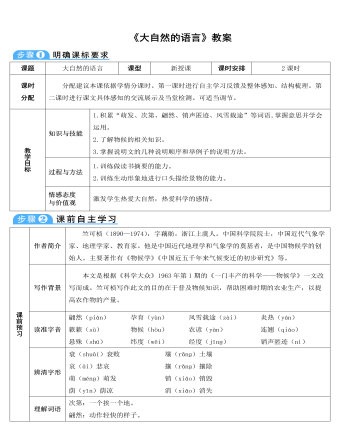
部编版语文八年级下册《大自然的语言》教案
结束这节课,我心里很轻松,因为在以往的教学中学生感觉到:说明文很单调、枯燥不生动。而本节课学生与我配合得非常好,原因是我利用多媒体展示的几幅画面,把学生的注意力都集中在所讲的内容中,并且调动了学生学习的积极性,认为物候现象就在我们的身边,激发学生探索科学奥秘的兴趣,更多地去了解大自然,认识大自然,热爱大自然。在初读课文的时候,我训练了学生的概括能力;在分清举例说明的方法时,让学生明白什么是举例子的说明方法;在细读课文的时候,让学生学习生动地有条理地说明事物的方法,还重点品味第一段的生动语言,在品味说明文语言的准确性时,有日常生活中的例子导入,深入浅出地讲解了说明语言准确性的两点情况。
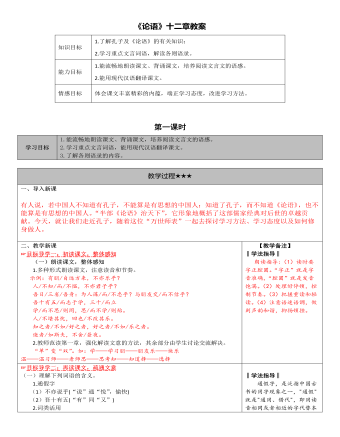
部编版语文七年级上册《论语》十二章教案
2.在新知与旧知、知识与实践的关系上,在学与思、学与问的关系上,孔子是怎么看的?新知与旧知的关系上,孔子认为“温故”可以“知新”。也只有“温故”“知新”的人才能当老师。这里,孔子强调的是“新知”,是那种开拓、创新的精神。在知识与实践的关系上,孔子认为“学而时习之”。学了知识要按时去实习,把所学的东西运用到行动上,在实践中提高对知识的掌握程度。在学与思的关系上,孔子认为学习与思考必须结合,二者缺一不可。只读书而不通过自己的头脑加以思考,就会感到迷惑;只是一味空想而不读书,就会精神疲惫。在学与问的关系上,孔子主张既学又问,不仅问知识才能比自己高的人,即使是知识才能比自己低的人,只要他们在某一方面有一技之长、一得之见,就应该虚心向他们求教,不以为羞耻。
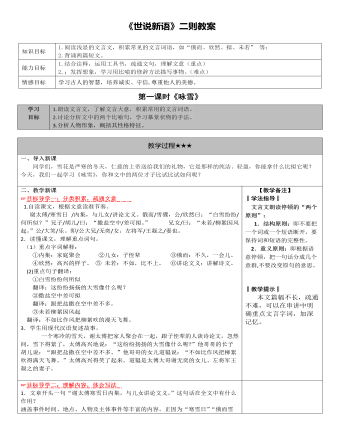
部编版语文七年级上册《世说新语》二则教案
?目标导学二:理解内容,体会写法 1.文章开头一句“谢太傅寒雪日内集,与儿女讲论文义。”这句话在全文中有什么作用? 涵盖事件时间、地点、人物及主体事件等丰富的内容。正因为“寒雪日”“俄而雪骤”,才能引出“咏雪。2.“寒雪”“内集”“欣然”“大笑”’等词语营造了一种怎样的家庭氛围?营造了一种融洽、欢快、轻松的家庭氛围。3.“咏雪”的过程中,文章特别记载了两个人的咏,即用“撒盐空中”和“柳絮因风起”来比拟“大雪纷纷”,你对其中哪一个更欣赏?为什么?“柳絮因风起”更好,因为柳絮比盐更像雪。给人以春天即将到来的感觉,意蕴强,有美感,这是“撒盐空中”所缺乏的。“撒盐空中”比喻了雪的颜色。 4.文章结尾交待了谢道韫的身份,有什么用意?谢太傅对两人的答案未做评定,只是“大笑乐”而已,十分耐人寻味。作者也没有表态,却在最后补充了道韫的身份,这是一个有力的暗示,表明他赞赏道韫的才气。
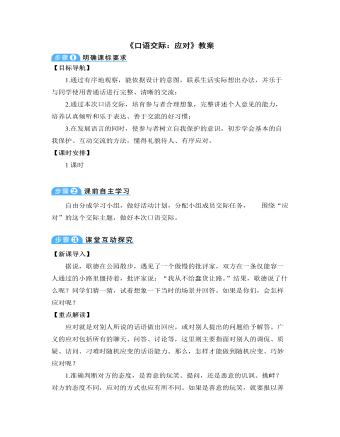
部编版语文八年级下册《口语交际:应对》教案
【研讨练习】题一:阅读下边的应对案例,简要说明这些名人采用了什么应对技巧。1.孔融十岁的时候就表现出超乎寻常的聪明才智,得到人们的赞许。有一个叫陈的官员却当众不以为然地说:“小时了了(聪明),大未必佳。”孔融立即回应道:“想君小时,必当了了。”2.一名英国女士非常喜欢钱钟书的小说《围城》,于是打电话给钱钟书请求见面。钱钟书对她说:“假如你吃了个鸡蛋觉得不错,何必认识那下蛋的母鸡呢?”3.一个年轻的画家拜访德国著名的画家阿道夫·门采尔,向他诉苦说:“我真不明白,为什么我画一幅画只用一会儿工夫,可卖出去要整整一年。”“请倒过来试试吧,”门采尔认真地说,“要是你花一年的工夫去画它,那么只用一天就准能卖掉它。”________________________________________________________________________________________________________________________________________参考答案:1.针锋相对2.归谬3.自嘲题二:在我们的生活当中,经常会碰到别人有意的嘲讽。阅读下面的情境,机智应对。
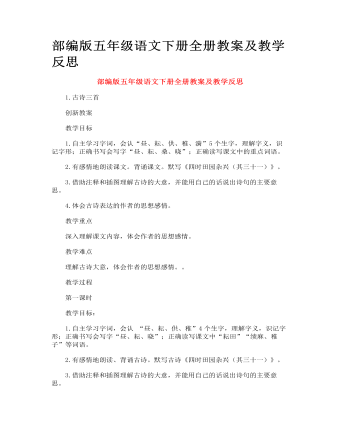
部编版五年级语文下册全册教案及教学反思
初读古诗,整体感知。 1.请同学们用自己喜欢的方式读古诗《四时田园杂兴》(其三十一)。要求借助拼音学会生字,把古诗读正确,读通顺。 2.指名多个学生朗读古诗,师生评议,纠正读得不准确的字音。尤其注意读准“昼、耘”的读音。指导读准多音字“供”([ gōng ]作动词时,准备着东西给需要的人应用:供应、供给(jǐ)、供求、供需、供销、提供、供不应求。[ góng ]奉献:供养、供献、供奉、供佛、供职;祭祀用的东西:供桌、供品、供果、上供;被审问时在法庭上述说事实:招供、口供、供状、供认、供词。)在诗中读四声。 3.把古诗反复多读几遍,通过查字典、问同学、问老师等方式,结合课文注释,理解诗句中词语的意思,用自己的话说说这首诗大体写了什么。记下不理解的地方和不明白的问题。 4.学生自愿举手发言,其他同学进行评议,也可以做补充发言。全班交流,教师相机引导并小结。
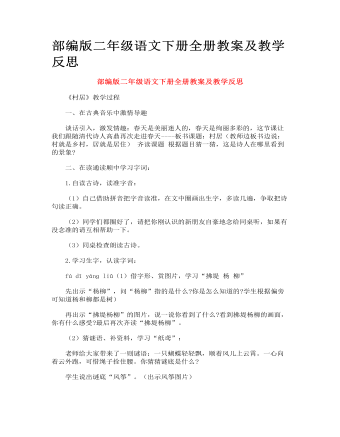
部编版二年级语文下册全册教案及教学反思
在入情入境中诵读成韵 1.配乐范读,想象画面: (1)学生边看插图边听老师配乐朗读,想象诗中所描绘的画面。 (2)学生自由交流想象中的画面,老师激励小结。 预设:山坡上的小草发芽了,嫩绿嫩绿的。黄莺在空中飞来飞去。河堤旁的柳条发芽了,几个下朋友放学回来,趁着东风,赶忙放起了风筝…… 2.借助插图,启发想象:黄莺一边飞一边干什么?(叽叽喳喳地叫)它好像在说什么? 再次启发想象:春风轻轻地吹来,柳条会怎样呢?(轻轻摆动,好像在跳舞陶醉在了美丽的春色里……) 诗人高鼎看到这样的景致写下了这样的诗句:出示“草长莺飞二月天,拂堤杨柳醉春烟”。(学生齐读) 让我们想象着春天的美丽景色,有滋有味地诵读。学生练读、指名读、引读。 3.联系生活,换位体验,:在这样美妙的春光里,沐浴着和煦的春风,(出示儿童放纸鸢图片)孩子们放起风筝,你们放过风筝吗?你放风筝时是怎样的心情?(学生自由发言)
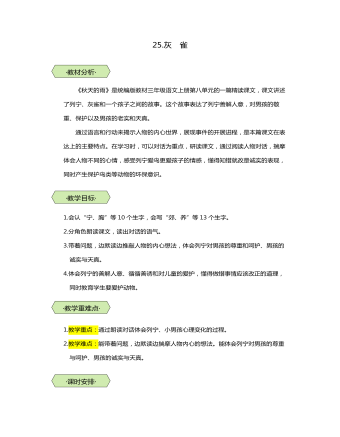
统编版三年级语文上第25课灰雀教学设计教案
《秋天的雨》是统编版教材三年级语文上册第八单元的一篇精读课文,课文讲述了列宁、灰雀和一个孩子之间的故事。这个故事表达了列宁善解人意,对男孩的敬重、保护以及男孩的老实和天真。通过语言和行动来揭示人物的内心世界,展现事件的开展进程,是本篇课文在表达上的主要特点。在学习时,可以对话为重点,研读课文,通过阅读人物对话,揣摩体会人物不同的心情,感受列宁爱鸟更爱孩子的情感,懂得知错就改是诚实的表现,同时产生保护鸟类等动物的环保意识。 1.会认“宁、胸”等10个生字,会写“郊、养”等13个生字。2.分角色朗读课文,读出对话的语气。3.带着问题,边默读边推敲人物的内心想法,体会列宁对男孩的尊重和呵护、男孩的诚实与天真。4.体会列宁的善解人意、循循善诱和对儿童的爱护,懂得做错事情应该改正的道理,同时教育学生要爱护动物。 1.教学重点:通过朗读对话体会列宁、小男孩心理变化的过程。2.教学难点:能带着问题,边默读边揣摩人物内心的想法。能体会列宁对男孩的尊重与呵护、男孩的诚实与天真。 2课时
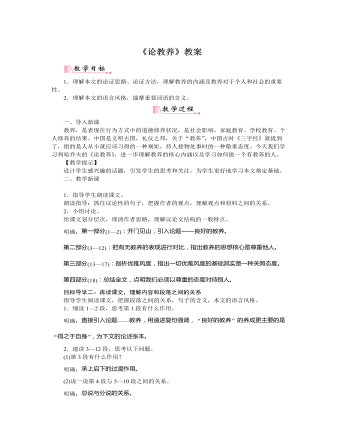
部编版语文九年级上册《论教养》教案
一、导入新课教养,是表现在行为方式中的道德修养状况,是社会影响、家庭教育、学校教育、个人修养的结果。中国是文明古国,礼仪之邦,关于“教养”,中国古时《三字经》就提到了,指的是人从小就应该习得的一种规矩,待人接物处事时的一种敬重态度。今天我们学习利哈乔夫的《论教养》,进一步理解教养的核心内涵以及学习如何做一个有教养的人。【教学提示】设计学生感兴趣的话题,引发学生的思考和关注,为学生更好地学习本文奠定基础。二、教学新课目标导学一:初读课文,理清层次1.指导学生朗读课文。朗读指导:抓住议论性的句子,把握作者的观点,理解观点和材料之间的关系。2.小组讨论。给课文划分层次,理清作者思路,理解议论文结构的一般特点。明确:第一部分(1—2):开门见山,引入论题——良好的教养。第二部分(3—12):把有无教养的表现进行对比,指出教养的思想核心是尊重他人。第三部分(13—17):剖析优雅风度,指出一切优雅风度的基础其实是一种关照态度。
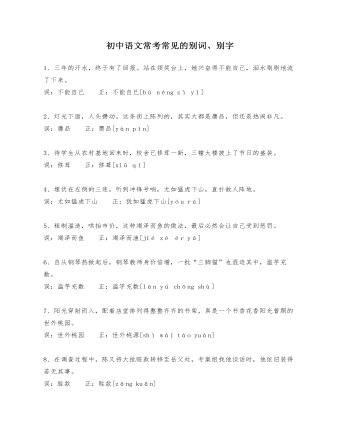
初中语文常考常见的别词、别字教案教学设计
1、三年的汗水,终于有了回报。站在领奖台上,她兴奋得不能自己,泪水刷刷地流了下来。误:不能自己 正:不能自已[bù néng zì yǐ] 2、灯光下面,人头攒动。这条街上陈列的,其实大都是膺品,但还是热闹非凡。误:膺品 正:赝品[yàn pǐn]3、待学生从农村基地回来时,校舍已修茸一新,三幢大楼披上了节日的盛装。误:修茸 正:修葺[xiū qì] 4、埋伏在左侧的三连,听到冲锋号响,尤如猛虎下山,直扑敌人阵地。误:尤如猛虎下山 正:犹如猛虎下山[yóu rú] 5、粗制滥造,哄抬市价,这种竭泽而鱼的做法,最后必然会让自己受到惩罚。误:竭泽而鱼 正:竭泽而渔[jié zé ér yú] 6、自从钢琴热掀起后,钢琴教师身价倍增,一批“三脚猫”也混迹其中,滥芋充数。误:滥芋充数 正:滥竽充数[làn yú chōng shù] 7、阳光穿射而入,配着店堂排列得整整齐齐的书架,真是一个书香花香阳光普照的世外桃园。误:世外桃园 正:世外桃源[shì wài táo yuán]8、在调查过程中,陈又将大批赃款转移至岳父处,专案组找他谈话时,他依旧装得若无其事。误:脏款 正:赃款[zāng kuǎn]
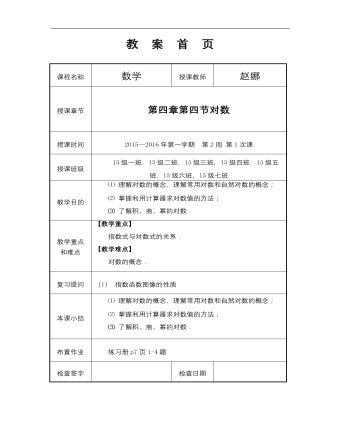
【高教版】中职数学基础模块上册:4.3《对数》优秀教案
课程名称数学授课教师赵娜授课章节第四章第四节对数授课时间2015—2016年第一学期 第2周第1次课授课班级15级一班,15级二班,15级三班,15级四班,15级五班,15级六班,15级七班教学目的⑴ 理解对数的概念,理解常用对数和自然对数的概念; ⑵ 掌握利用计算器求对数值的方法; ⑶了解积、商、幂的对数.教学重点 和难点【教学重点】 指数式与对数式的关系. 【教学难点】 对数的概念.复习提问(1) 指数函数图像的性质本课小结⑴ 理解对数的概念,理解常用对数和自然对数的概念; ⑵ 掌握利用计算器求对数值的方法; ⑶了解积、商、幂的对数.布置作业练习册p7页1-4题检查签字 检查日期
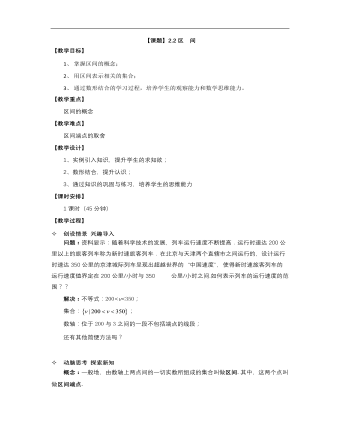
【高教版】中职数学基础模块上册:2.2《区间》优秀教案
【教学目标】1、掌握区间的概念;2、用区间表示相关的集合;3、通过数形结合的学习过程,培养学生的观察能力和数学思维能力。【教学重点】区间的概念【教学难点】 区间端点的取舍【教学设计】 1、实例引入知识,提升学生的求知欲;2、数形结合,提升认识;3、通过知识的巩固与练习,培养学生的思维能力【课时安排】 1课时(45分钟)【教学过程】² 创设情景 兴趣导入问题:资料显示:随着科学技术的发展,列车运行速度不断提高.运行时速达200公里以上的旅客列车称为新时速旅客列车.在北京与天津两个直辖市之间运行的,设计运行时速达350公里的京津城际列车呈现出超越世界的“中国速度”,使得新时速旅客列车的运行速度值界定在200公里/小时与350 公里/小时之间.如何表示列车的运行速度的范围??解决:不等式:200<v<350;集合:;数轴:位于200与3之间的一段不包括端点的线段;还有其他简便方法吗?
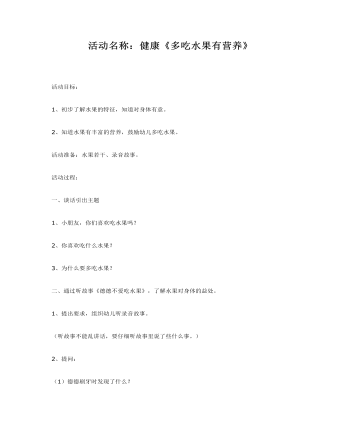
中班体育教案:多吃水果有营养(1)
2、知道水果有丰富的营养,鼓励幼儿多吃水果。活动准备:水果若干、录音故事。活动过程:一、谈话引出主题1、小朋友,你们喜欢吃水果吗?2、你喜欢吃什么水果?3、为什么要多吃水果?
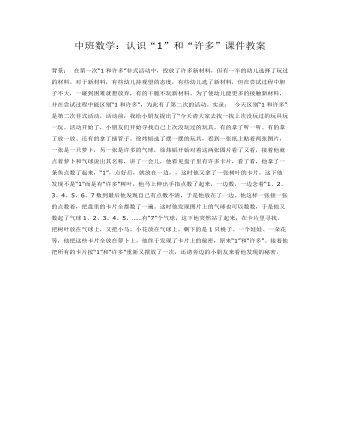
中班数学:认识“1”和“许多”课件教案
实录: 今天区别“1和许多”是第二次非式活动,活动前,我给小朋友提出了“今天请大家去找一找上次没玩过的玩具玩一玩。活动开始了,小朋友们开始寻找自己上次没玩过的玩具。有的拿了听一听、有的拿了放一放、还有的拿了插管子。徐炜韬选了摆一摆的玩具,看到一张纸上贴着两张图片,一张是一只萝卜,另一张是许多的气球,徐炜韬开始对着这两张图片看了又看,接着他就点着萝卜和气球说出其名称,讲了一会儿,他看见盘子里有许多卡片,看了看,他拿了一条鱼点数了起来,“1”,点好后,就放在一边,,这时他又拿了一张树叶的卡片,这下他发现不是“1”而是有“许多”树叶,他马上伸出手指点数了起来,一边数,一边念着“1、2、3、4、5、6、7数到最后他发现自己有点数不清,于是他放在了一边。
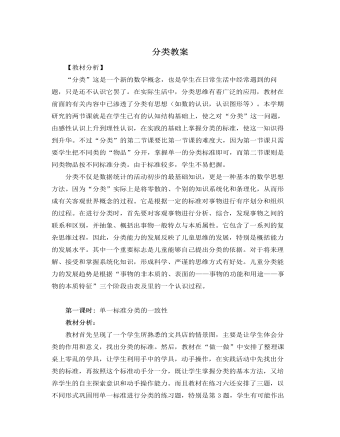
人教版新课标小学数学一年级上册分类教案
教学目标:1.能选择不同的标准对同一类物品进行不同的分类,掌握分类的方法。2.初步感知不同标准分类的意义,体验分类结果在不同标准下的多样性。3.培养学生思维的灵活性和发散性,养成良好的学习、生活习惯。4.培养学生的操作能力、观察能力、判断能力、语言表达能力和合作交流的意识。5.让学生体会到生活中处处有数学,学会用学到的知识解决生活中的实际问题。教学重、难点:重点:选择不同标准分类难点:思维的发散性 关键:在直观中拓展思维的时空教学准备:铅笔、实物卡片、学具袋(各种形状、颜色各异的物品)教学过程:一、观察分析 多重分类1.师出示如书本P39页的铅笔。(1)观察这些铅笔有什么不同?并把它们分分类。(2)四人一小组交流、讨论可以怎么分类?是按什么分的?比比哪一组的分法最多。
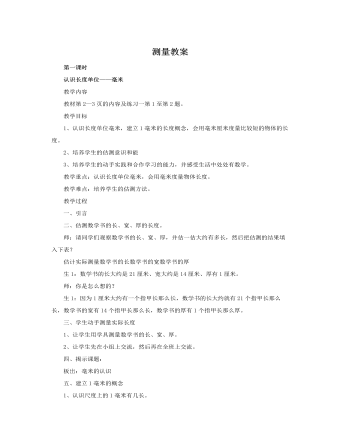
人教版新课标小学数学三年级上册测量教案
教学目标1、认识长度单位毫米,建立1毫米的长度概念,会用毫米厘米度量比较短的物体的长度。2、培养学生的估测意识和能3、培养学生的动手实践和合作学习的能力,并感受生活中处处有数学。教学重点:认识长度单位毫米,会用毫米度量物体长度。教学难点:培养学生的估测方法。教学过程一、引言二、估测数学书的长、宽、厚的长度。师:请同学们观察数学书的长、宽、厚,并估一估大约有多长,然后把估测的结果填入下表?估计实际测量数学书的长数学书的宽数学书的厚生1:数学书的长大约是21厘米、宽大约是14厘米、厚有1厘米。师:你是怎么想的?生1:因为1厘米大约有一个指甲长那么长,数学书的长大约就有21个指甲长那么长,数学书的宽有14个指甲长那么长,数学书的厚有1个指甲长那么厚。

